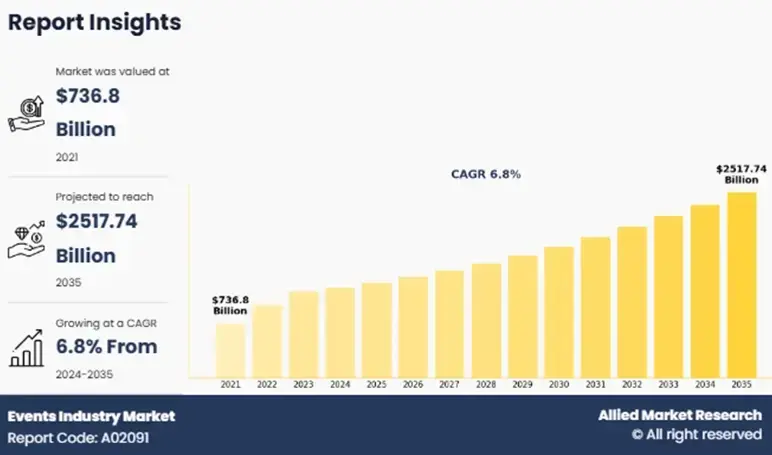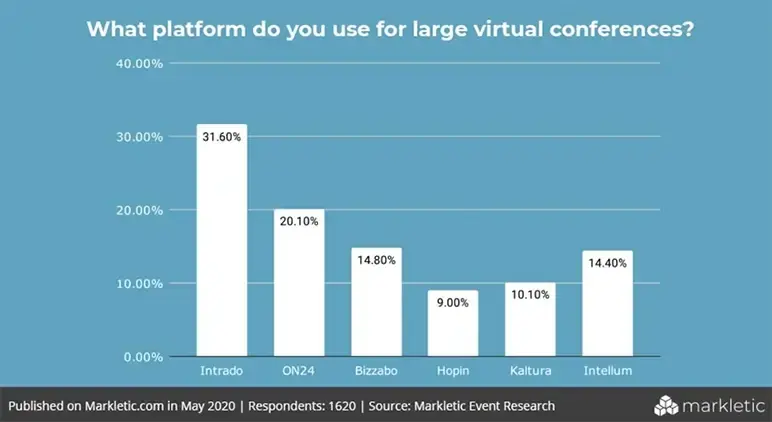Want to stay ahead in the fast-evolving event industry? This blog dives into the top event industry statistics, covering everything from hybrid events and AI trends to sustainability and attendee preferences.
Whether you're an event planner, marketer, or business leader, these insights will help you make smarter decisions, boost engagement, and plan successful events.
Let's dive in.
Top Event Industry Statistics 2025 (Top Findings)
- The global events industry is experiencing strong growth and is projected to reach $1.34692 trillion in 2025, up from $1.2273 trillion in 2024, reflecting a compound annual growth rate (CAGR) of 9.7%.
- Projections estimate the market size will continue to grow to $1.93026 trillion in 2029, with a CAGR of 9.4%
- By 2028, the event industry could surpass $1.5 trillion, demonstrating its robust growth and potential
- By 2025, 78% of event planners are expected to adopt hybrid event formats, combining in-person and virtual elements to cater to a wider audience.
- 62% of event organizers are prioritizing sustainability in their events by 2025, focusing on reducing waste, using eco-friendly materials, and minimizing carbon footprints.
- 85% of brands are expected to see a significant increase in sales by integrating live event marketing campaigns with emerging technologies in 2025.
- Experiential events, which focus on immersive and interactive experiences, are expected to grow by 45% by 2025.
- The event industry is expected to fully recover from the COVID-19 pandemic by 2025, with in-person attendance levels returning to 90% of pre-pandemic levels.
- Artificial intelligence (AI) will continue to drive content delivery, making events more engaging, accessible, and reusable.
- 66% of top meeting professionals anticipate increased event budgets for 2025.
- More than 61% of millennials and 63% of Gen Z attendees plan to attend more global events in 2025 and beyond, highlighting the importance of engaging younger demographics.
- Despite the rise of virtual formats, 86.4% of organizers plan to maintain or increase the number of in-person events in 2025 compared to 2024.
Event Industry Overview
The event industry is rapidly expanding, covering conferences, exhibitions, corporate events, and festivals. To keep you ahead of the curve, here's a quick market overview with key insights on growth, trends, and regional performance.
| Metric | Details |
|---|---|
| Global Market Size (2025) | $1,552.9 billion |
| Projected Market Size (2035) | $2.5 trillion |
| CAGR (2025-2029) | 13.50% |
| Market Share by Segment | - Corporate Events: 35% - Exhibitions/Trade Shows: 25% - Music & Live Events: 20% - Sports Events: 10% - Others: 10% |
| Top-Performing Countries | 1. United States 2. China 3. Germany 4. United Kingdom 5. Japan |
| Regional Insights | Asia-Pacific: Expected to exhibit a CAGR of 7.7%, driven by emerging economies |
| Emerging Trends | Hybrid events, AI-driven tools, and sustainability are shaping the future of the industry |
Top Event Industry Statistics 2025
The event planning industry is undergoing a transformative phase, from global market trends to the adoption of cutting-edge technologies; these insights will provide a comprehensive understanding of where the event industry is headed. Let's dive into the key stats that every event professional, marketer, and business leader should know.
1) Global event industry statistics
As of 2025, the global events industry market is experiencing significant growth and transformation. Here are key statistics highlighting its current state:
- The global event industry was valued at $736.8 billion in 2021 and is expected to grow to $2.5 trillion by 2035, with a CAGR of 6.8% from 2024 to 2035. (Source)
- The Asia-Pacific region is expected to experience the fastest growth, with a projected CAGR of 13.3% during the forecast period. (Source)
- The leading five meeting destinations in North America for 2024 were Las Vegas, New York City, Los Angeles, Chicago, and Toronto. (Source)
- The event management software market is expected to reach $16.11 billion by 2026. (Source)
- As many as 40 million Americans participate in business events annually. (Source)
- Approximately 67% of executives anticipate higher meeting budgets in 2024, indicating increased confidence in the value of events. (Source)
- An impressive 90% of event organizers predict that large-scale events will be either remote or hybrid within the next two years. (Source)
- Approximately 86% of event marketing professionals agree that technology plays a crucial role in enhancing event outcomes. (Source)
- Corporate event spending is projected to rise in 2025, with the cost per attendee reaching $169 per day. (Source)
- Approximately two-thirds (10,985) of the 15,427 individuals who entered the workforce after the pandemic were new to the events industry. (Source)
- Over 50% of companies are cutting event emissions by reducing waste and prioritizing recyclable materials. (Source)
- Small gatherings are the most popular type of virtual event, followed by networking events and roundtable discussions. (Source)
- More than 65% of event organizers are impacted by inflation, resulting in higher costs across multiple event aspects. (Source)
- Email marketing ranks as the second most popular event promotion method, following social media at 89%. (Source)
- According to top-level event professionals, 63% of meetings in 2024 were in-person, 19% were virtual, and 18% were hybrid. (Source)
2) Event marketing statistics
Event marketing trends continue to be one of the most effective strategies for businesses to engage audiences, generate leads, and drive sales. Below are the latest event marketing statistics that will help you understand event marketing more precisely:
- The global event marketing industry is projected to reach $722.67 billion by 2028. (Source)
- In 2025, 86% of brands are set to witness a significant increase in sales after integrating live event marketing campaigns with emerging technologies. (Source)
- U.S. companies invest approximately $122 billion each year in event marketing. (Source)
- 28% of businesses leverage event marketing to support their sales teams directly. (Source)
- 61% of marketers consider events their most vital marketing tool. (Source)
- 95.5% of respondents confirmed that virtual events will remain part of their event strategy for the next year. (Source)
- 13% of global businesses reported allocating 1-5% of their marketing budget to event marketing, while 10% spent more than half of their budget on it. (Source)
- 80% of event planners report that their organizations consider sustainability when organizing events. (Source)
- Over 90% of event marketers consider their virtual and hybrid events successful. (Source)
- In 2023, 90% of event organizers anticipated that all large-scale events would be either remote or hybrid. (Source)
- 26% of event marketers cited a shortage of human resources as a challenge in meeting objectives, 23% highlighted budget constraints, and 20% pointed to technology limitations. (Source)
- 47% of event marketers believe that in-person events deliver the highest ROI. (Source)
3) Virtual event statistics
- The global virtual event market is projected to grow from USD 236 billion in 2023 to USD 1,066 billion by 2032, with a CAGR of 18.8%. (Source)
- North America leads the market with a 38.4% share, driven by strong digital infrastructure and widespread adoption of virtual technologies. (Source)
- 31.6% of B2B marketers choose Intrado for hosting large virtual conferences, while 20.1% prefer ON24 as their virtual conference platform. (Source)
- Live video streaming is widely adopted across industries, with broadcasters and media companies making up 30% of its usage. (Source)
- 33.7% of marketers report that the average cost per attendee for a virtual event ranges between $500 and $1,000. (Source)
- 60% of virtual event organizers use social media to drive significant registrations. (Source)
- 59% of event professionals believe virtual events are a lasting part of their event strategy. (Source)
- 41% of event organizers prefer Zoom for small virtual events, while 29% use Microsoft Teams as the next most popular choice. (Source)
- 28.4% of survey respondents preferred a mix of virtual and in-person events. (Source)
- 13.8% of organizations allocate over $500,000 for virtual events, 14.2% budget between $100,000 and $500,000, while 18% set aside $10,000 to $100,000. (Source)
4) Corporate event planning industry statistics
These corporate event stats highlight the strategic planning involved in corporate events, helping you emphasize the importance of early preparation, technological integration, and a growing commitment to sustainability.
- The global corporate event market is projected to expand at a CAGR of 10.61% between 2023 and 2029. (Source)
- In 2024, 46% of organizations held internal meetings outside their corporate office city, 52% will use hotels, and 36% will opt for non-hotel venues. (Source)
- Demonstrating event ROI is the highest priority for 95% of event teams. (Source)
- In 2024, 50% of in-person event attendees rates have reported a reduced travel budget. (Source)
- 47% of event planners identify costs as their biggest source of dissatisfaction. (Source)
- 60% of companies find in-person gatherings the most effective for generating revenue, compared to hybrid and virtual events. (Source)
- A Freeman survey revealed that 82% of event attendees favor in-person meetings, with 75% considering them the most reliable source of information. (Source)
- The majority of executives (60%) consider events the most vital marketing channel for achieving corporate goals. (Source)
- Corporate events account for the largest share of the event management industry, with an expected CAGR of 10.5% till 2032. (Source)
5) Hybrid event industry statistics
Hybrid events, which combine in-person and virtual elements, have become a game-changer in the event industry. Here are key statistics on the hybrid event industry to keep you updated in 2025:
- Hybrid events, blending in-person and virtual components, have increased in popularity by 20% in 2024. (Source)
- A survey by event management platform Bizzabo revealed that 97% of industry professionals anticipate an increase in hybrid events in the future. (Source)
- 38% of event organizers say hybrid events require more preparation time than solely in-person or virtual events. (Source)
- 97% of event professionals foresee hybrid events becoming a vital component of the events industry in the future. (Source)
- 97% of event planners expect hybrid events to become more prevalent in the future, while 80% have already hosted or plan to host one. (Source)
- 35% of event organizers find it challenging to secure the right venue for hosting a hybrid event. (Source)
- 73% of event planners say hybrid events offer a better attendee experience, while 63% find them more engaging than virtual events. (Source)
- 46% of event organizers report that speakers struggle to engage both virtual and in-person audiences at the same time. (Source)
- 49% of respondents cited balancing physical and digital experiences as a key challenge for hybrid events, while 42% pointed to managing hybrid logistics as a barrier. (Source)
- 67.8% of attendees favor in-person and hybrid events, while 32.2% prefer webinars and virtual events. (Source)
6) Technology advancement in event industry statistics
Technology is revolutionizing the event industry, making events more engaging, efficient, and accessible. Below are the latest statistics on technology advancements in the event industry to keep you updated on what’s next:
- An impressive 90% of event professionals agree that technology plays a crucial role in event success, emphasizing its significance in modern event planning. (Source)
- 41% of event planners now leverage AI for content creation, logistics, and data analysis, showcasing its increasing role in the industry. (Source)
- A survey found that 63% of planners use AI tools to optimize event management, highlighting its expanding role in the industry. (Source)
- 68.9% of event organizers say event software improves event success, while 90% of professionals post-pandemic believe technology plays a key role in better outcomes. (Source)
- A recent survey revealed that 85% of brands saw a significant sales boost after incorporating emerging technologies like AR and VR into live event marketing campaigns. (Source)
- 78% of event marketers plan to continue hosting in-person events in the future. (Source)
- In 2025, 81% of event managers are hosting virtual events, highlighting the growing demand for engaging online experiences that reach broader audiences. (Source)
- Event professionals are using advanced event management software and technology to enhance attendee experiences. Here are some key tools shaping successful events: (Source)
| Technology | Usage Percentage |
|---|---|
| Onsite check-in tools | 47% |
| Wearable technology | 30% |
| Mobile apps | 61% |
| AI | 42% |
| Virtual reality (VR) | 41% |
| QR codes | 47% |
What's your opinion?
Provide your answer in this poll and see what industry professionals predict as the biggest game-changer for the event industry in 2025! 🚀
What do you think will have the biggest impact on the event industry in 2025?
- Option A) AI & Automation – Smarter event planning and data-driven insights.
- Option B) Hybrid & Virtual Experiences – More seamless integration of online and offline events.
- Option c) Sustainability & Green Events – Eco-friendly initiatives taking center stage.
The bottom line
With technological advancements and the rising enthusiasm of Gen Z, as well as professionals for concerts and events, the industry is set for significant growth.
Staying updated with the latest trends and figures is essential to stay ahead of the competition, no matter how you're connected to this industry. This blog has provided 40+ key event industry statistics for 2025, offering valuable insights into the event industry.
We hope you found these insights valuable and that they guide you in your event planning and strategy.
Frequently Asked Questions
What is the current size of the global event industry?
The global events industry was valued at $1022.4 billion in 2024. With event planning statistics showing strong growth, projections estimate that it will reach $2.5 trillion by 2035.
What are the emerging trends in event planning for 2025?
Hybrid events, integrating virtual reality and in-person experiences, along with data-driven decision-making and agile event management, are key to event success for event management companies.
How does the event industry contribute to the economy?
The event industry is a catalyst for business growth, tourism, and community development; with projections showing a significant economic impact, which drives substantial revenue and creates numerous opportunities.
What types of events are experiencing the most growth?
Corporate events and seminars are experiencing major growth, driven by the need for networking and training. Companies are leveraging event apps and technology to create successful events.
What are the most common challenges faced by event organizers today?
Event organizers often grapple with fitting events into wider marketing plans, managing budgets, and demonstrating event ROI while ensuring flexibility.
What are the projected trends for the event industry in the next five years?
The event industry is projected to grow significantly, driven by digital transformation and increasing corporate events, with key event industry statistics showing a rise in hybrid and virtual formats.
What are the average costs associated with organizing a major event?
The costs of major events vary widely, with venue and arrangements being significant expenses; digital technologies and marketing are crucial investments for successful events.






